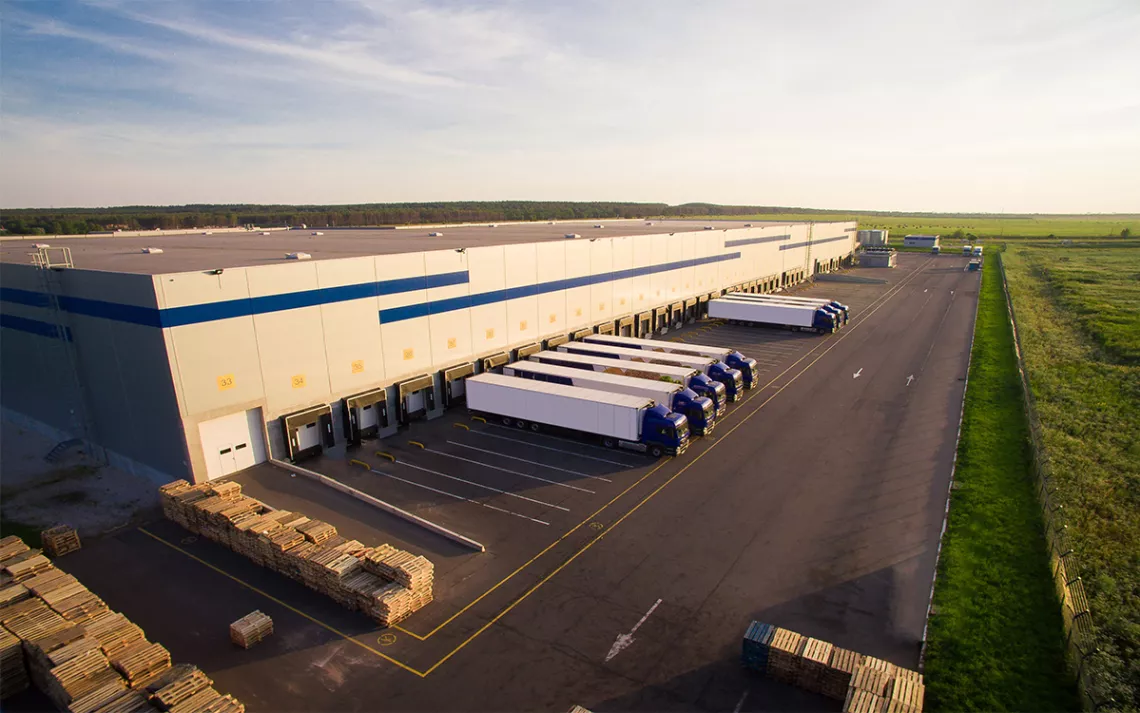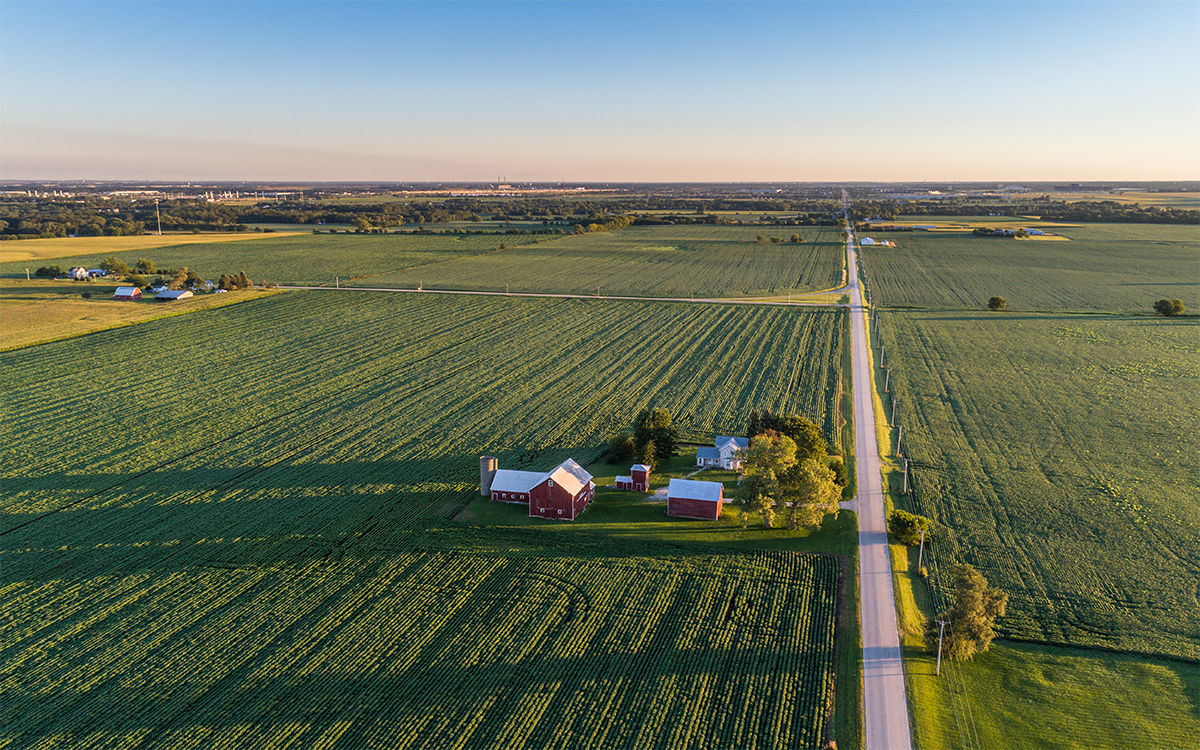Boxed In: Retail Warehouses Pave Over Pristine Farmland
An agrarian haven is being transformed into a global-supply-chain hub

Photo by valtron84/iStock
Each spring, when the topsoil thaws and planting season kicks into gear, Larry Coldwater takes stock of the landscape he has called home for nearly 70 years. The house he shares with his wife, Julie Baum-Coldwater, sits on the edge of Coldwater Seed Farm’s 540-acre property. From the front porch, he can see the original homestead his great-great-grandfather built in 1858, its copper-colored barn nestled among trees between soybean and wheat seedbeds. Across the road to the south is the largest tract of protected land in northeastern Illinois. To the east are more family-run farms, a patchwork of earth-colored plots unfolding for miles. In these moments of pause, Larry often remembers what his father would say when they shared the view: “So flat, and so perfect for farming.”
The Coldwaters' slice of America’s agricultural heartland sits on unincorporated land in Will County, Illinois, just 40 miles southwest of downtown Chicago. For the Coldwaters and other farming families in Will County, the region’s fertile soil holds rich history. “We’ve nurtured and cared for this land for generations,” Julie said. “Your heart and soul ends up being tied to the ground.”
The Coldwaters hope to eventually pass the farm on to their son, as four generations have done before them. But Will County’s agricultural heritage is in jeopardy. In the early 2000s, developers began buying up huge tracts of land in the area to make way for a different sort of industry. Big-box retail corporations like Walmart and The Home Depot were rapidly expanding at the time, relying on networks of warehouse facilities where products could be processed and packaged as they made their way from factories to shelves. The rush to build superstores in every corner of America generated an unprecedented demand for new transport centers and warehouses. Will County soon found itself in developers’ eyesight—with its canal system, six class-1 railroads, four interstate highways, and expanses of undeveloped land, the Coldwaters’ agricultural haven happened to be a warehouse magnet.

Coldwater Seed Farm | Photo courtesy of Daniel Peters
Will County’s new era began in 2002 with the opening of the CenterPoint Intermodal Center, a 6,400-acre rail terminal where shipping containers are transferred from trains to trucks. The success of that facility incited a spree of warehouse developments throughout the farmland nearby. A dizzying volume of retail products now passes through those warehouses—3 million shipping containers’ worth of goods flowed through the county in 2017 alone. CenterPoint is now America’s busiest inland port. Over the span of Larry Coldwater’s lifetime, Will County has transformed from a collection of sparsely populated agrarian communities to a crossroads of global commerce.
Many long-time residents had figured that developers would eventually come en masse for Will County farmland. After all, the Chicago suburbs one county over were once rural outposts as well. “It was always gonna happen,” said Larry Walsh, a local farmer who was recently elected as Will County Executive. “Our location and infrastructure was always going to be an invite for development.”
But Will County wasn’t facing typical urban sprawl when retailers first pinned it as the next “Global Transportation Center.” This sort of development—the conversion of a rural inland area into a major freight hub—had little precedent at the time, and few could have predicted how quickly and dramatically it would impact Will County’s landscape and the livelihoods of its residents.
Tens of thousands of semi-trucks pass through Will County daily. One local road in Elwood, a village of 2,200, sees an average of 8,000 trucks each day. Gridlock is now the norm along many of the county’s thoroughfares. “You used to sit on Route 52 and be stuck behind a tractor and a wagon. Now it’s semis,” Walsh said.
In some areas, truck activity presents a serious public safety threat. Certain local roads serve as key access points to rail terminals and warehouses, and reports of trucks barreling through residential areas, crosswalks, school zones—even the national cemetery in Joliet—are common. In 2016, a passenger train collided with a semi on its way to CenterPoint, near Laraway Elementary in Joliet, leaving debris strewn on the school’s property. The district eventually decided to build a new school to keep students safe from freight traffic.
Between 2014 and 2016, there were 20 truck-related deaths in Will County. “It’s really a safety issue. It’s a matter of life and death,” said Gary VanderBent in a video for SafeRoads Illinois, a campaign started by county residents advocating for stricter regulation of semi traffic.
In the face of mounting opposition from residents, county officials continue to approve warehouse projects. Each plan for a new freight facility comes with a fresh set of assurances from developers and city managers alike. In the beginning of Will County’s transport boom, residents and local officials welcomed the industry, assured that warehouses and intermodal centers would be a boon to the region’s rural communities. In the late 1990s, the firm behind CenterPoint won over residents in the small village of Elwood by promising a new way of life. The influx in tax revenue would fund improvements to the school and to local infrastructure. A bustling intermodal center nearby would bring the village its own grocery store and hotel. None of those promises have come to fruition yet, and the village will only receive tax increments from CenterPoint for two more years. “Twenty years later and we have none of those things,” said Elwood native Delilah LeGrett. “There’s no hotel, no grocery store. All we have is a lot of pollution and traffic.”
The freight industry has also failed to bring high-paying, long-term jobs to the region. Will County’s unemployment rate recently fell to 5 percent—the lowest it has been since the recession—but that figure may be misleading. Mega-retailers keep prices low and shelves stocked by cutting costs along their supply chains, so it’s always in their interest to provide as few full-time jobs as possible. A firm developing warehouses may promise to bring thousands of jobs to the community, but a large portion of those jobs will be outsourced to temp labor firms, who hire part-time work during periods of high demand. The retailers that have moved into Will County advertise benefits and a living wage for their warehouse staff, but nearly half of Will County’s warehouse jobs go to temp workers, who rarely get hired on as full-time employees and are often paid below minimum wage. “It’s sort of a Ponzi scheme,” said Mark Meinster, director of Warehouse Workers for Justice, an organization in Will County that advocates for better warehouse jobs. “City managers pretend like it’s all gonna work out, but if none of these employers are providing good, stable jobs, and all are using your roads and services, it’s going to eventually catch up to you.”
Despite mounting opposition from residents, warehouse development in Will County shows no signs of slowing. Around 50 percent of the county’s land remains undeveloped, and the freight industry is now looking to build away from population centers and farther into Will County’s stretches of pristine farmland. Those farmers who chose not to sell their land have managed to thrive through Will County’s freight explosion, but that way of life is growing harder and harder to maintain.
Cashing out was never an option for the Coldwaters—after all, selling to warehouse developers would mean paving over their family history. Still, they feared the wave of development would eventually reach their doorstep. “It was only a matter of time before they built here,” Julie said.
Last year their fears were confirmed by a notice from the nearby village of Elwood. In 2007, the Coldwaters allowed the village to incorporate a small portion of their property to allow for residential developments. Last year they received notice that Elwood planned to use that agreement as a basis to annex their entire plot—not for housing but for more freight. If the annexation goes through, the Coldwater farm would eventually be hemmed in on two sides by Compass Business Park, a proposed trucking hub twice the size of Chicago-Midway Airport. A road they use daily to move farming equipment would become a dedicated corridor for semis. “If this thing goes through, it’s going to destroy our operation,” Julie said.
Their only recourse was to file a lawsuit against the village of Elwood. The Coldwaters are now embroiled in a legal battle against the town their ancestors helped found, to protect the land they have spent over a century cultivating.
The Coldwaters likely face an expensive and protracted fight. They have the backing of thousands of Will County residents who are fed up with freight, but it’s unclear how much that will count. Earlier this year, Elwood’s Planning and Zoning Commission held a public hearing about the plans for Compass Business Park. Around 800 residents—almost half of Elwood’s total population—packed into the local elementary school’s gymnasium. All but four of the meeting’s nearly 100 speakers opposed the plan. Many mentioned the Coldwater family and other local farmers whose operations would be threatened by the project. At the meeting’s close, without adjourning to deliberate, the commission voted 3-1 in favor of the park. Boos echoed through the gymnasium. Some people cried.
“Once again, local officials are siding with warehouse developers,” Julie said. “But we’re still holding out hope. People are still mad.”
 The Magazine of The Sierra Club
The Magazine of The Sierra Club



